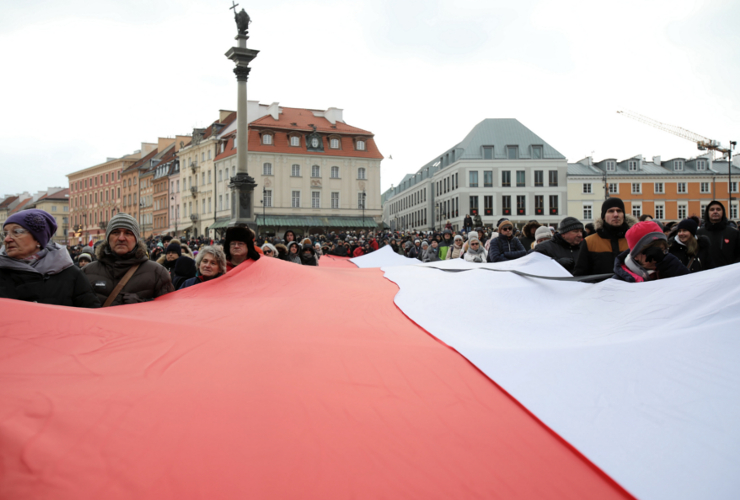The death of Gdańsk Mayor Paweł Adamowicz, who was stabbed at a charity event on Jan. 13, has shocked Poland. While tragedies of this kind can help bring people together, the killing has instead underscored the polarization of Poland’s media landscape. As Poland heads towards parliamentary elections this fall, Adamowicz’s death has highlighted how the public television broadcaster routinely attacks opposition politicians and other critics of the government.
A liberal who served as the city’s mayor since 1998, Adamowicz opposed the governing Law and Justice (PiS) party’s anti-immigrant stance. In 2017, he was one of twelve mayors to adopt a declaration on the “friendly acceptance of migrants”.
With Poland divided between supporters and opponents of the PiS government, many commentators have called for the murder not to be politicized. The exact motives of the attacker, a 27-year-old man from Gdańsk, remain unclear.
Nevertheless, in its coverage of Adamowicz’s death on Jan. 14, TVP’s main evening news programme, Wiadomości, attacked the opposition, accusing it of spreading hatred.
“Unfortunately in the past there was no shortage of overly strong words”, the voiceover said, in the context of calls not to politicize the murder.
This was followed by various pieces of footage without context, including of then-Prime Minister Donald Tusk telling opposition lawmakers in 2010 that they will “die out like dinosaurs” (the full phrase had been “if you don’t come to understand this, you will die out like dinosaurs”) and of an attack on PiS’s office in Łódź by a former member of the Civic Platform (PO) party in 2010.
The footage focused on Tusk and other senior politicians associated with the opposition.
The material was broadly criticized by Polish commentators. After receiving complaints, Poland’s National Broadcasting Council is investigating the matter.
Prior to his death, Adamowicz was repeatedly attacked by TVP’s Wiadomości in the run-up to the mayoral elections last fall, in which he was re-elected, defeating PiS’s candidate.
“Paweł Adamowicz was presented [by Wiadomości] as one of the darkest figures on the Polish political scene”, journalist Janusz Schwertner wrote in an article on the Onet.pl portal analysing the news programme’s depiction of Adamowicz over the past year.
In several clips over that period, Wiadomości levelled a range of accusations against Adamowicz, from financial irregularities in his assets to promoting nazism and communism.
“A real scandal was triggered by [Adamowicz’s] decision to name one of Gdańsk’s trams after Adolf Butenandt, accused of participating in the criminal experiments of [Nazi doctor Josef] Mengele”, said the voiceover in material broadcast by Wiadomości last summer.
As in the other cases, the information was presented without context. As the analysis by Onet.pl notes, the audience was not told that the tram had been named after Butenandt, a German biochemist who worked in the city in the 1930s, in 2011 following an Internet vote. It had been retracted in 2017 in light of Butenandt’s Nazi past.
[separator style_type=”none” top_margin=”15″ bottom_margin=”20″ sep_color=”#eae9e9″ border_size=”” icon=”” icon_circle=”no” icon_circle_color=”#ffffff” width=”” alignment=”center” class=”” id=””]
[content_boxes layout=”clean-horizontal” columns=”1″ icon_align=”left” title_size=”18″ backgroundcolor=”#98cbb8″ icon_circle=”” icon_circle_radius=”” iconcolor=”#98cbb8″ circlecolor=”#98cbb8″ circlebordercolor=”#98cbb8″ circlebordercolorsize=”” outercirclebordercolor=”#98cbb8″ outercirclebordercolorsize=”” icon_size=”” link_type=”” link_area=”” animation_delay=”” animation_offset=”” animation_type=”0″ animation_direction=”down” animation_speed=”0.1″ margin_top=”0″ margin_bottom=”0″ class=”” id=””]
[content_box title=”#V4PressFreedom” icon=”” backgroundcolor=”#98cbb8″ iconcolor=”#000000″ circlecolor=”#98cbb8″ circlebordercolor=”” circlebordercolorsize=”” outercirclebordercolor=”” outercirclebordercolorsize=”” iconrotate=”” iconspin=”no” image=”” image_width=”35″ image_height=”35″ link=”” linktarget=”_self” linktext=”” animation_type=”0″ animation_direction=”down” animation_speed=”0.1″]
This article is part of IPI’s #V4PressFreedom series, which tracks and analyses threats to press freedom and independent journalism in the V4 countries: Poland, Hungary, Slovakia and the Czech Republic.
[/content_box]
[/content_boxes]
